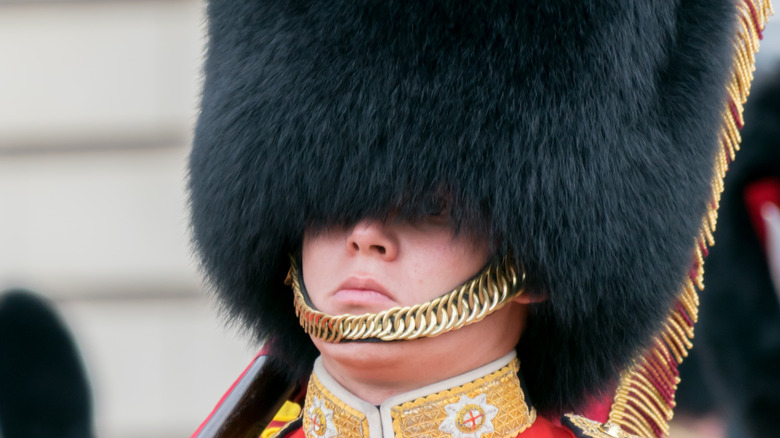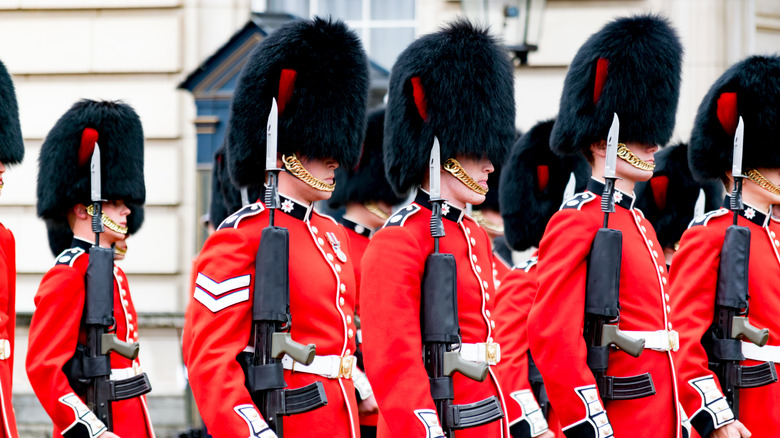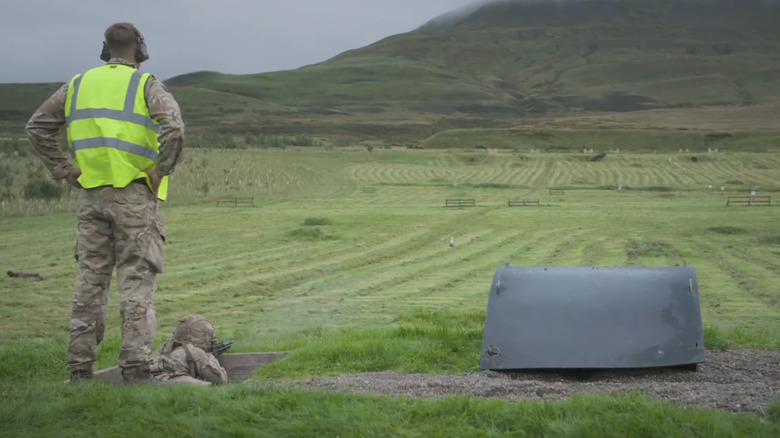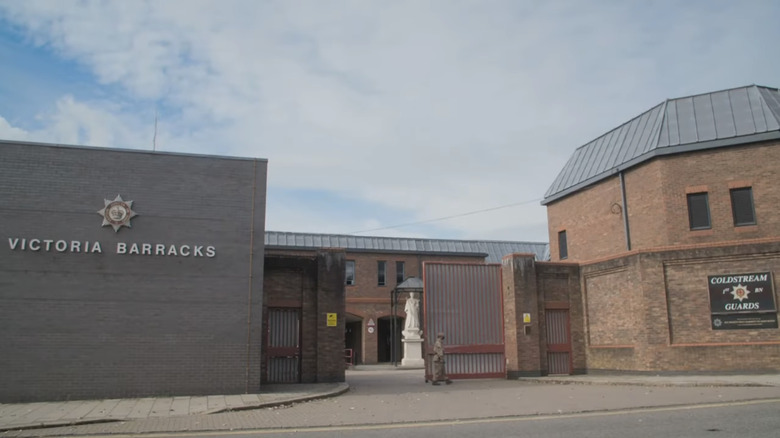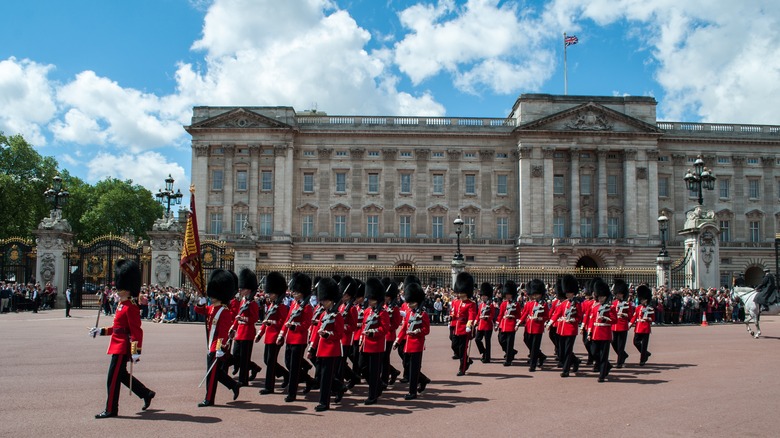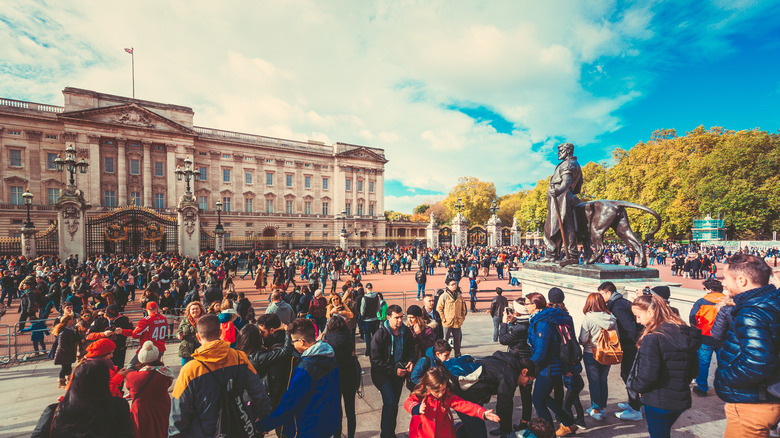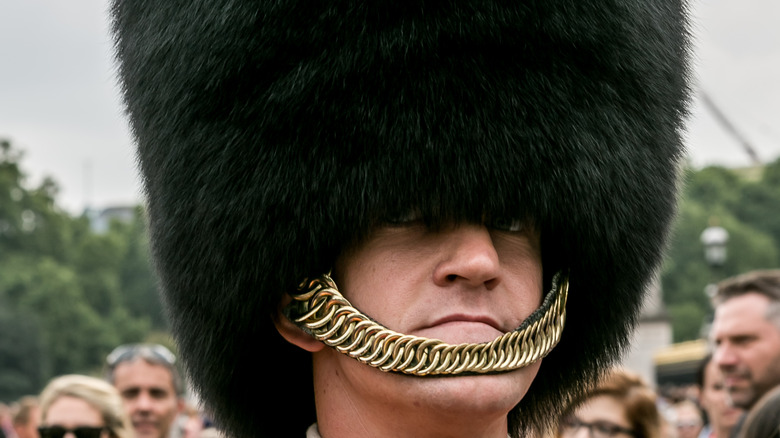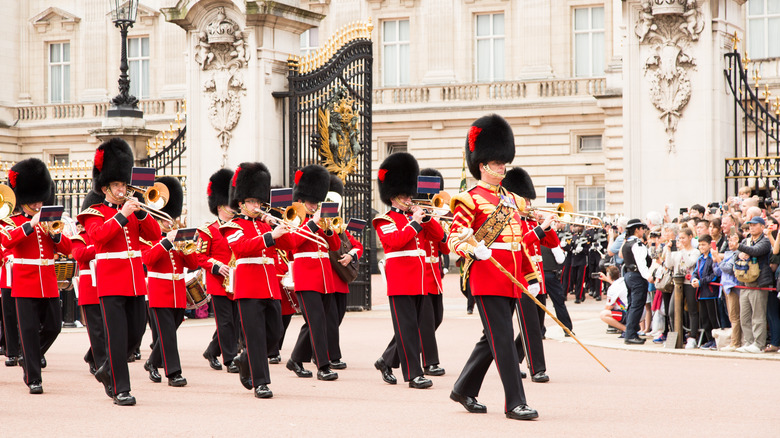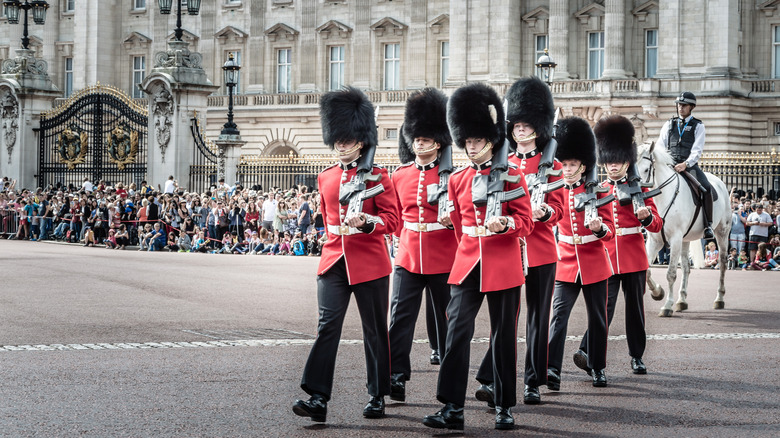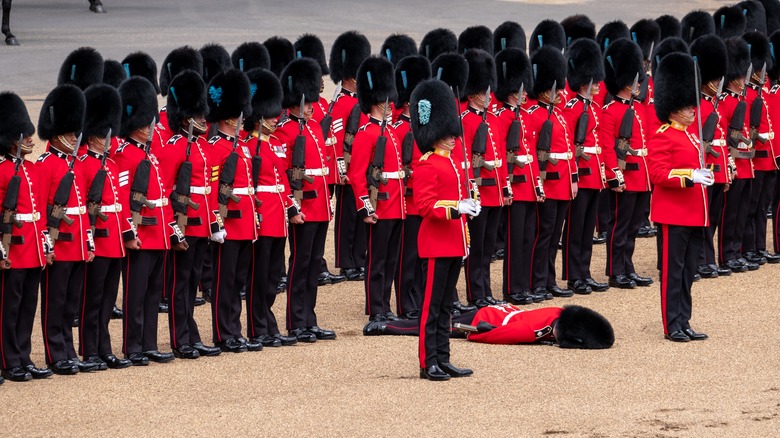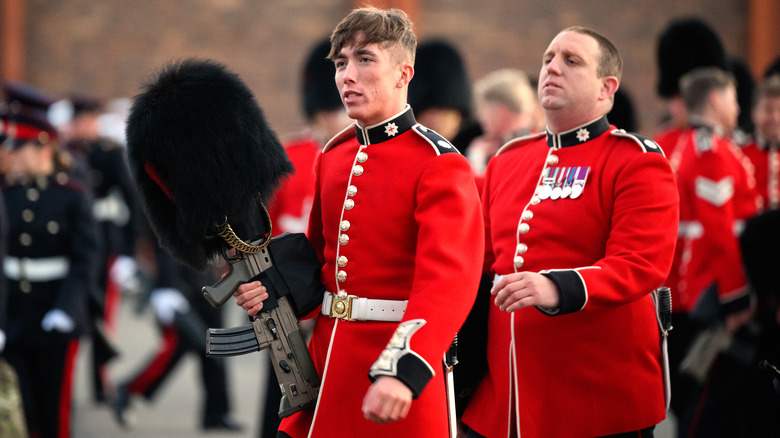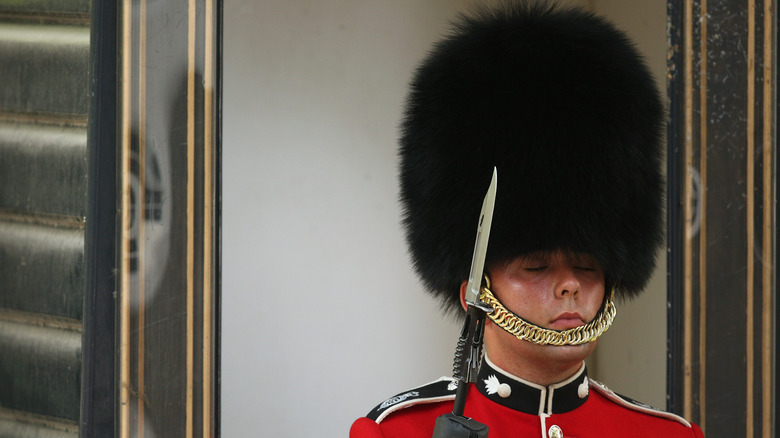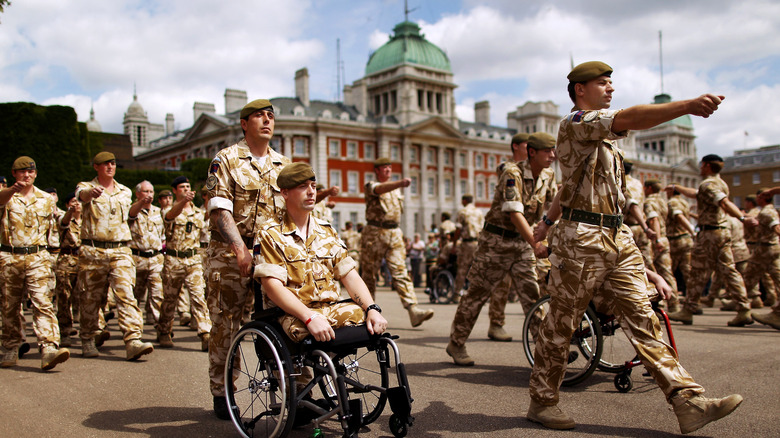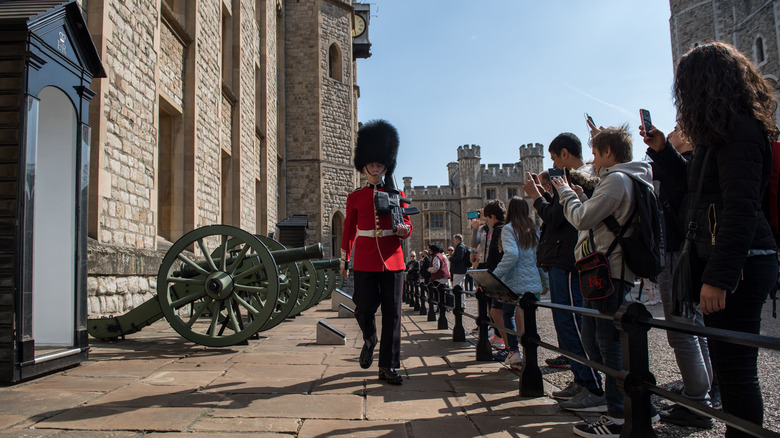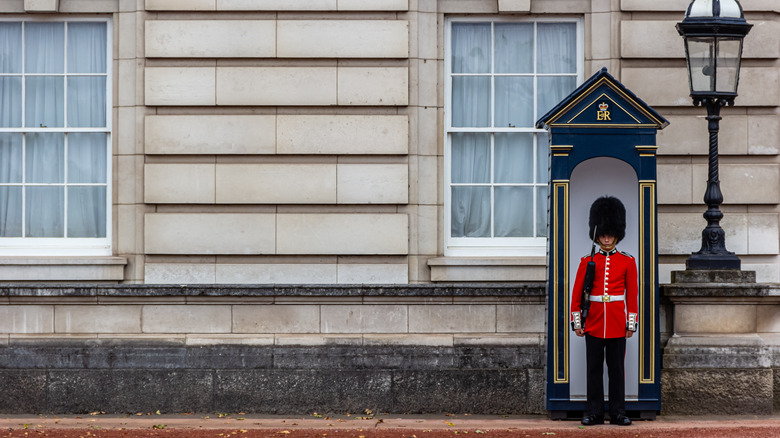What It's Really Like To Be A British Guard
The British guard was first established in 1660 and has had such prestigious and martially impressive units that soldiers of all walks of life have joined, from commoners to aristocrats. The Coldstream, the Grenadiers, the Scots, Irish and Welsh Guards, have all served with honor and distinction for centuries, not just as elite warriors of the British army but also as stalwart defenders of the crown.
In the modern age, the members of the guard have evolved in major ways, including historic changes like Commonwealth troops protecting the monarch and the first women to serve in the vital role as well. Yet regardless of the differences, key aspects have remained the same in all these years. The soldiers whose duty is to stand watch over the royal residences are still among the top in entire army of the United Kingdom. Furthermore, the guard have not wavered in their highly disciplined conduct, which is so impressive to watch that tourists swarm to see almost daily.
Behind the ceremonial spectacles and legendary tales are real people, though, who can struggle like anyone under such immense pressure. The tough, regimented life of the esteemed royal guardsmen might not be for everyone, but if you asked most of them if the job should be easier, they probably would not have it any other way.
Only tall soldiers are recruited
Before becoming a member of the prestigious British guard, most prospective soldiers are used to towering over the rest of the populace. This is because the battalions have always favored exceptionally tall recruits as a simple way of fielding a more imposing force in battle. Royal guardsmen are already trained to be some of, if not, the best warriors in the entire army, but just having larger troops can also be another way to intimidate the enemy.
In the past, when close combat was a more prominent feature of warfare, the height requirement was very strict. However, more recently, the attribute is not as important as it once was, and the rule has become slightly more lax. When interviewed by Timeout, Sgt. Martin of the guardsmen explained, "Traditionally, if you were in the Queen's Company within the Grenadier Guards, you had to be 6' 2" or over. They were known as 'the models' because they were so tall. I'm 5' 10" myself, so there was a time when I wouldn't have made it."
They must pass an exam and undergo extensive combat training
Contrary to the belief of some outside of the U.K., due to their close association with ceremonial duties, the British guard are a formidable fighting force within the army. Thus, prospective members must first pass a competency examination called the British Army Recruitment Battery test. BARB is made up of five different sections and only takes about a half an hour for the average candidate to finish. The primary objective of the exam is to assess how fast a recruit is able to process information and make logical decisions.
The successful completion of a comprehensive combat training course is another critical requirement, which can last up to 30 weeks for those who take up ceremonial duties outside of royal residences. From firearms practice on ranges to other combat instruction, along with the perfection of marching standards, new recruits are pushed to learn essential martial skills quickly and are given little leniency by the officers in charge. When interviewed by Channel 5, Capt. Freddie Ruscombe-King explained of the new recruits, "We're responsible for teaching a load of people skills that they have never used in their life. The don't know how to do anything we're about to teach them, apart from maybe run."
Salaries also come with housing and meals
While becoming a member of the British guard comes with considerable respect and a whole lot of responsibility, the take home pay is not that ideal, especially in the beginning. The average a soldier in the army makes £21,425 annually, with officers making a decent amount more at £28,556, so given their important role in the military, guardsmen earn at the higher ends of these numbers depending on their rank.
But what also needs to be taken into consideration is that fact that all of the soldiers are provided with meals and housing, such as at Victoria Barracks in close proximity to the Windsor Castle. Guardsmen eat together in the mess hall of their barracks, and when stationed at royal residences to protect the monarch and their family, the well-balanced breakfasts and lunches are reliably provided each day, according to Stars and Stripes.
Guard duties begin before sunrise
As with the elite troops of any military, the British guard start their days very early. So early, in fact, that on days when it is their duty to protect the royal residences of the monarchy, the soldiers are up before the sun has risen. When describing the morning's preparation to the Londonist, Guardsman Jack Davies of the Welsh Guards 1st Battalion said, "I wake up around 5 a.m. and we're expected to be on parade at the barracks by half-past. Senior officers check that we're in position and looking smart enough to represent the Army and the United Kingdom to thousands of visitors to London. We then have a rehearsal at our barracks in London before heading out to mount the guard for the rest of the day."
The morning duties mean that by the time the guardsmen have reached their posts outside Buckingham Palace around 10:45 a.m., they have already been awake for five hours and completed a list of tasks. On top of the rehearsal and inspection, this also includes making their bed, and cleaning themselves, their uniforms, as well as the barracks.
The guardsman's sentry duty lasts for two hours and is then followed by four hours off in the nearby guardroom where they are able to rest. Once the shift is over and the changing of the guard occurs, the transition is done ceremoniously with music from the guards' band playing throughout.
Dealing with the public can be grueling at times
The members of the British guard designated for sentry duty over the royal residences reach their posts before noon. By that time, the public has already begun to gather, so they can watch the troops march in formation on parade towards Buckingham Palace. While this may be their primary destination, the palace is not the only vital location the guardsmen both ceremonially, and literally, protect if necessary. Jack Davies told the Londonist, "I also have duties at Windsor Castle and the Tower of London. My first Trooping the Color was a highlight for me — marching down the Mall in front of the huge crowds was an amazing experience." Those who would dislike the prospect of having a mass of strangers stare in their direction all day would probably find the position far from ideal, as Davies added, "It's a great job if you like people watching. I was taken aback by how many people there were at first."
Tourists and other onlookers can be extremely difficult to deal with at times. When talking with Stars and Stripes, guardsmen described some of the harassment and abuse they face, from those who tug on the bearskin caps to others place banana peels on the ground to try to trip them. In 1959, the abuse got so bad that there was a railing put up to separate the royal sentries from the public. More recently, in a Reddit Q&A, a member of the guard with the username, nibs123, talked about his worst experience when drunken fools tried to get past him and climb the fence of the royal residence before he was forced to confront them.
Their characteristic hats are old and heavy
Like much of the ceremonial aspects to being a member of the British guard, the wearing of the traditional bearskin hat stretches back for hundreds of years. When talking with Timeout, Sgt. Martin explained, "In the Napoleonic Wars we took the bearskin from Napoleon's grenadiers, which is why we are now known as grenadiers and why the guards wear the bearskins to this day. It's a battle honor and one we're proud to uphold." Along with the historical significance, there was also a very practical reason for the adoption of the hats because they make the soldiers appear even taller and more imposing than they already are.
Made with real bearskin pelts that costs £650 each and can last up to 80 years, there were attempts made by the Ministry of Defense to find synthetic alternatives to address ethical concerns but were unsuccessful, in large part because the hats were more difficult for soldiers to wear when sodden. However, the durability of the traditional bearskin means that they can be passed down for decades.
One major drawback to such a large military cap for the guardsmen is how heavy it is on their heads, which gets worse when wet and can lead to headaches over time, as nibs123 mentioned in the Reddit Q&A. When talking with the Londonist, Jack Davies talked about similar issues and said, "It can be a long day and your neck starts to ache from the weight of the bearskin cap after a few hours."
Presentable uniforms are top priority
Because the highly visible members of the British guard spend so much time in front of the public, they are required to make sure their unforms are in impeccable condition at all times. Even though the bearskin caps stand out the most, the focused attention to detail is put on all the other components of the standard dress as well.
Such diligence is not just a result of avoiding the reprimands of senior officers during inspections before parade marches, but out of personal pride and the desire to honor the royal company in front of the public. When talking with the Londonist, Jack Davies described the pressure and said, "I'm always aware that people are looking at us closely and taking lots of photos, so I put a lot of work into looking after the uniform. Our red tunic, bearskin cap and bright white belt all need to be cleaned and polished, and our heavy black boots and brass buttons require constant care and attention."
There are no bathroom breaks while on the job
When performing their critical sentry duties, the members of the British guard are not allowed to take breaks, even it is done just for a moment to use the restroom. In fact, the rule is taken so seriously that guardsmen must remain at their posts under any circumstances unless there is a dire emergency that cannot be handled by local police, and someone nearby is in real danger.
Following such strict guidelines can create some extremely awkward situations, as the guardsman, nibs123, explained in the Reddit Q&A. He described one very embarrassing story and said, "On a parade in front of a large crowd, one of my fellow guardsmen needed to relieve himself and couldn't hold it any longer. He was on the front row and left a huge obvious puddle where he was. Some of the crowd noticed and started laughing."
They can lose consciousness from standing so long
During the already highly emotional event of Queen Elizabeth II's lying in state, the live broadcast also showed a shocking moment when one of the guards during the long ceremony lost consciousness and crashed down to the floor. It is unsurprising that anyone could faint at that time when it is taken into consideration that each one of them stands with very little movement for a period of six hours throughout the 24-hour traditional ceremony.
Though even in normal circumstances, the chances of passing out are still a major concern, so steps are literally taken to prevent the disaster. In their Reddit Q&A, nibs123 explained, "You are allowed to move, but only to turn to the left, march about 10 paces turn around and go back to standing still. Its best to do this every 10 minutes or so to stop yourself from fainting from the blood that gets trapped in your legs."
The rifles of guards are often unloaded when not in combat
While the Royal Guard are still among the top warriors in the British army, the modern era has led to significant changes in the way the soldiers operate when they are not in warzones or active combat. During the Reddit Q&A, nibs123 said, "Our role has dropped a lot over time. We used to be fully guarding. Now, it is more ceremonial. The guarding part is done mostly by the police."
Since most threats are now handled by law enforcement, the anonymous guardsman also admitted, "You only carry live rounds if there is a high threat level that someone will attack, but I have never carried any." On the other hand, they stressed that the martial skills of the elite infantrymen may still be relied upon when absolutely necessary. Even if the soldier standing guard has an unloaded weapon, there are several others in the nearby guardroom who can quickly arm themselves to handle any serious threat.
Hot weather is quite uncomfortable
On top of the occasional abuse from the public, their heavy hats, and the general discomfort from standing still or marching most of the day, there is also the need for British guardsmen to overcome whatever the season throws at them. Jack Davies told the Londonist, "No concessions are made for the weather — we're allowed to wear a cape on our way to the palace if it's raining, but apart from that you're exposed to the elements."
Even worse, the rule of standing completely still is so strict that in excessive heat, they cannot wipe away the sweat off their foreheads, according to nibs123 in the Reddit Q&A. The guardsmen also have to deal with the nuisance of having the polish on their boots melt as well. On the other hand, they do receive some respite in the most extreme conditions, as water or juice is provided to prevent the soldier from passing out due to heatstroke.
They are expected to serve in combat operations at any moment
In recent times, the sentry duties of the British guard may have gradually become more ceremonial in nature, but the same certainly cannot be said about their exploits on the field of battle. Historically, the units of guardsmen have been exceptional warriors in the army of the U.K., and that remains true to this day.
In modern warfare, the elite soldiers can fulfill an assortment of critical military roles. In the interview with the Londonist, Jack Davies described what it was like to serve in Afghanistan and said, "During our seven months in Kabul our primary role was force protection — keeping mentors at the Afghan National Army Officer Academy safe from harm. We also provided the Quick Reaction Force for any incidents within the city."
Davies also pointed out how quickly the objective of his unit can shift from protecting the royal residences to fighting overseas. He added, "It's strange to think you can go from formal occasions at the palace to front line operations almost overnight, but everyone's resilient and the intense training helps you get used to the mix of demanding roles."
They must behave in a specific way or face penalties
Because a place within the units of the British guard is such an important position often in clear view for all to see, their actions are extremely restricted, and their conduct is put under intense scrutiny. Any steps out of line, regardless of how minor, are met with reprimands. Sgt. Martin explained to Timeout, "We swear an oath of allegiance to do as we're told, and part of our orders is to remain steady and show the status of the royal family. If a guard were to be caught laughing, there would be a re-education at a military prison in Colchester to make sure they're still aware of their responsibilities when they're on post."
The strict guidelines over their behavior can at times lead to awkward situations for the guardsmen, such as in a specific moment for Martin when he was on duty and an attractive tourist asked to kiss him on the cheek. Under any other circumstances, he admitted that he would have gladly let her do so, but in his guard role he was forced to tell strongly reject her advances.
On a Reddit Q&A, nibs123 admitted tourists have been able to make them laugh (although it's not clear if they ever got caught). Consequences also include a hefty fine.
Overcoming boredom has to be done secretly
During sentry shifts, soldiers of the British guard must remain silent for long periods and spend a lot of time in their own heads. So, over the years, they have had to devise ways to somehow keep their minds preoccupied. When talking with Timeout, Sgt. Martin provided an example of the method that some guardsmen have relied on and said, "At St. James's Palace everyone has a stab at counting the bricks in front of them. Someone counted nearly 200, but there seems to be a different result each time."
Some guards have used more nefarious ways to kill the boredom, as nibs123 admitted during a Reddit Q&A: "When I'm really bored, I like to mess peoples' pictures up," but then went into more specific detail about one instance and added, "I waited until the cameraman was counting down to take the pic then marched up and down my post until they all left. A little evil, I know, but it is a long a** time."
These methods, and others like singing songs or playing out movie scenes from memory, are all fine because they do not interfere with the important task at hand. However, when a member of the guard posted a highly inappropriate TikTok video in the middle of his shift, that was absolutely unacceptable. Not only did the soldier receive punishment but also harsh criticism from military officers, such as the condemning statements of Admiral Lord Alan West in an interview with MailOnline.
